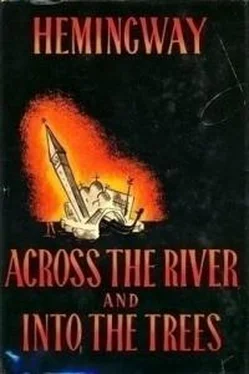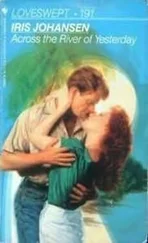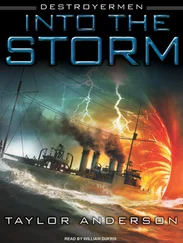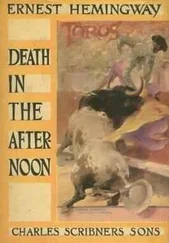'Explain it to him,' the Colonel said. 'He's not a man who drinks labels either.'
'Agreed.'
'In the meantime you might as well drink this. It is very good you know.'
'It is,' the Colonel said. 'But it isn't Chambertin.'
'What did we use to drink?'
'Anything,' the Colonel said. 'But now I seek perfection. Or, rather, not absolute perfection, but perfection for my money.'
'I seek it, too,' the Gran Maestro said. 'But rather vainly.'
'What do you want for the end of the meal?'
'Cheese,' the Colonel said. 'What do you want, Daughter?'
The girl had been quiet and a little withdrawn, since she had seen Alvarito. Something was going on in her mind, and it was an excellent mind. But, momentarily, she was not with them.
'Cheese,' she said. 'Please.'
'What cheese?'
'Bring them all and we'll look at them,' the Colonel said.
The Gran Maestro left and the Colonel said, 'What's the matter, Daughter?'
'Nothing. Never anything. Always nothing.'
'You might as well pull out of it. We haven't time for such luxuries.'
'No. I agree. We will devote ourselves to the cheese.'
'Do I have to take it like a corn cob?'
'No,' she said, not understanding the colloquialism, but understanding exactly what was meant, since it was she who had been doing the thinking. 'Put your right hand in your pocket.'
'Good,' the Colonel said. 'I will.'
He put his right hand in his pocket and felt what was there, first with the tips of his fingers, and then with the insides of his fingers, and then with the palm of his hand; his split hand.
'I'm sorry,' she said. 'And now we begin the good part of it again. We will dedicate ourselves to the cheese with happiness.'
'Excellent,' the Colonel said. 'I wonder what cheeses he has?'
'Tell me about the last war,' the girl said. 'Then we will ride in our gondola in the cold wind.'
'It was not very interesting,' the Colonel said. 'To us, of course, such things are always interesting. But there were only three, maybe four, phases that really interested me.'
'Why?'
'We were fighting a beaten enemy whose communications had been destroyed. We destroyed many divisions on paper, but they were ghost divisions. Not real ones. They had been destroyed by our tactical aviation before they ever got up. It was only really difficult in Normandy, due to the terrain, and when we made the break for Georgie Patton's armour to go through and held it open on both sides.'
'How do you make a break for armour to go through? Tell me, please.'
'First you fight to take a town that controls all the main roads. Call the town St. Lo. Then you have to open up the roads by taking other towns and villages. The enemy has a main line of resistance, but he cannot bring up his divisions to counter–attack because the fighter–bombers catch them on the roads. Does this bore you? It bores the hell out of me.'
'It does not bore me. I never heard it said understandably before.'
'Thank you,' the Colonel said. 'Are you sure you want more of the sad science?'
'Please,' she said. 'I love you, you know, and I would like to share it with you.'
'Nobody shares this trade with anybody,' the Colonel told her. 'I'm just telling you how it works. I can insert anecdotes to make it interesting, or plausible.'
'Insert some, please.'
'The taking of Paris was nothing,' the Colonel said. 'It was only an emotional experience. Not a military operation. We killed a number of typists and the screen the Germans had left, as they always do, to cover their withdrawal. I suppose they figured they were not going to need a hell of a lot of office workers any more and they left them as soldiers.'
'Was it not a great thing?'
'The people of Leclerc, another jerk of the third or fourth water, whose death I celebrated with a magnum of Perrier–Jouet Brut 1942, shot a great number of rounds to make it seem important and because we had given them what they had to shoot with. But it was not important.'
'Did you take part in it?'
'Yes,' the Colonel said. 'I think I could safely say, yes.'
'Did you have no great impressions of it? After all, it was Paris and not everyone has taken it.'
'The French, themselves, had taken it four days before. But the grand plan of what we called SHAEF, Supreme, get that word, Headquarters of the Allied Expeditionary Forces, which included all the military politicians of the rear, and who wore a badge of shame in the form of a flaming something, while we wore a four–leafed clover as a designation, and for luck, had a master plan for the envelopment of the city. So we could not simply take it.
'Also we had to wait for the possible arrival of General or Field Marshal Bernard Law Montgomery who was unable to close, even, the gap at Falaise and found the going rather sticky and could not quite get there on time.'
'You must have missed him,' the girl said.
'Oh, we did,' the Colonel said. 'No end.'
'But was there nothing noble or truly happy about it?'
'Surely,' the Colonel told her. 'We fought from Bas Meudon, and then the Porte de Saint Cloud, through streets I knew and loved and we had no deads and did as little damage as possible. At the Etoile I took Elsa Maxwell's butler prisoner. It was a very complicated operation. He had been denounced as a Japanese sniper. A new thing. Several Parisians were alleged to have been killed by him. So we sent three men to the roof where he had taken refuge and he was an Indo–China boy.'
'I begin to understand a little. But it is disheartening.'
'It is always disheartening as hell. But you are not supposed to have a heart in this trade.'
'But do you think it was the same in the time of the Grand Captains?'
'I am quite sure it was worse.'
'But you got your hand honourably?'
'Yes. Very honourably. On a rocky, bare–assed hill.'
'Please let me feel it,' she said.
'Just be careful around the centre,' the Colonel said. 'It's split there and it still cracks open.'
'You ought to write,' the girl said. 'I mean it truly. So someone would know about such things.'
'No,' the Colonel disagreed. 'I have not the talent for it and I know too much. Almost any liar writes more convincingly than a man who was there.'
'But other soldiers wrote.'
'Yes. Maurice de Saxe. Frederick the Great. Mr. T'sun Su.'
'But soldiers of our time.'
'You use the word our with facility. I like it though.'
'But didn't many modern soldiers write?'
'Many. But did you ever read them?'
'No. I have read mostly the classics and I read the illustrated papers for the scandals. Also, I read your letters.'
'Burn them,' the Colonel said. 'They are worthless.'
'Please. Don't be rough.'
'I won't. What can I tell you that won't bore you?'
'Tell me about when you were a General.'
'Oh, that,' he said and motioned to the Gran Maestro to bring champagne. It was Roederer Brut '42 and he loved it.
'When you are a General you live in a trailer and your Chief of Staff lives in a trailer, and you have bourbon whisky when other people do not have it. Your Gs live in the C.P. I'd tell you what Gs are, but it would bore you. I'd tell you about G1, G2, G3, G4, G5 and on the other side there is always Kraut–6. But it would bore you. On the other hand, you have a map covered with plastic material, and on this you have three regiments composed of three battalions each. It is all marked in coloured pencil.
'You have boundary lines so that when the battalions cross their boundaries they will not then fight each other. Each battalion is composed of five companies. All should be good, but some are good, and some are not so good. Also you have divisional artillery and a battalion of tanks and many spare parts. You live by co–ordinates.'
Читать дальше
Конец ознакомительного отрывка
Купить книгу












